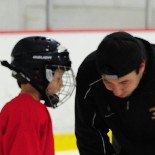Being a youth hockey coach can be incredibly fun…but it can
also be incredibly challenging and frustrating as well. Coaches often get upset
when things don’t go as planned with a game, when players don’t use the skills
they’ve been taught, or when a system they’ve worked hard on just doesn’t seem
to be working.
While frustration is normal with any sport, youth hockey
coaches can feel better and be more effective at their jobs if they remember a
few key tips.
Celebrate the Good
First things first, all coaches are encouraged to celebrate
the things their players do right and the things that go well. There’s so often
a tendency to dwell on the negatives and on what needs improvement that the
good often gets overlooked.
Don’t be that coach who’s so busy yelling at his players
that you forget to praise them too. After each game, say a whole lot more about
the good than the bad. Remember, these are kids you’re dealing with, and they
thrive on praise and encouragement a whole lot more than criticism.
Keep it Simple
Another big tip is to keep systems as simple as possible.
Even the most skilled young players are still young players. They’re often not
good at remembering overly complex or difficult strategies.
Thus, remember who you’re dealing with and keep systems as
simple as possible. It will save you and your players a whole lot of
frustration and anxiety.
Don’t Set Your Expectations too High
As a final word of wisdom, coaches must keep their
expectations in check when it comes to their young players. First, they have to
make sure they are not projecting anything, like their own unfulfilled
aspirations, onto their players’ shoulders.
Then, they also have to ensure they’re not setting the bar
too high. This isn’t to say that coaches shouldn’t believe in or expect great
things from their players, but they should keep their expectations within
reason given the age of the children they’re dealing with.






